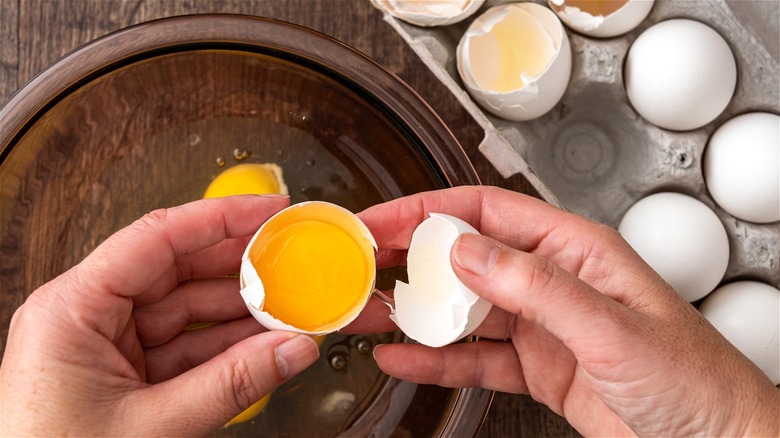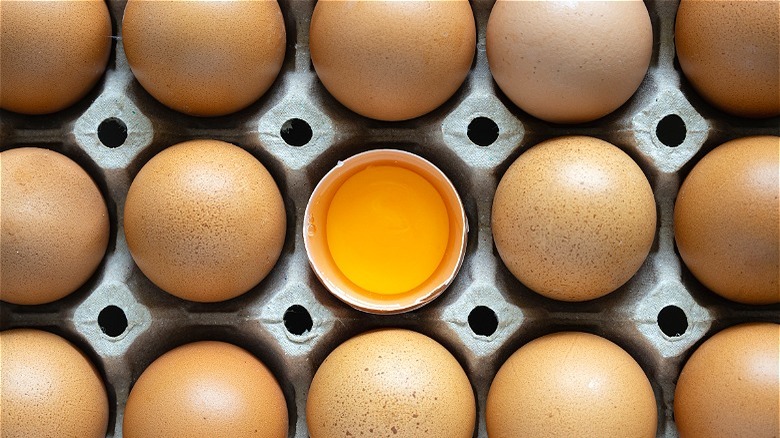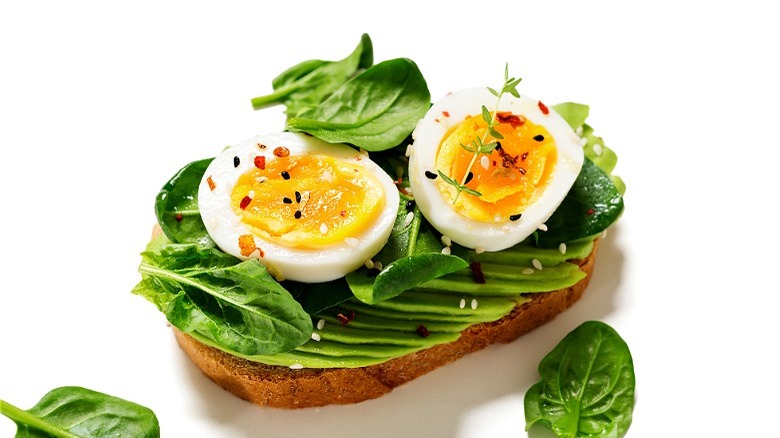The Scientific Reason We Love Putting Eggs In So Many Recipes
If you aren't vegan and allergies aren't an issue, eggs probably serve as a staple in your everyday diet. Most Americans, in fact, put away more eggs than you'd probably guess off-hand. According to Statista, in 2022 alone, more than 270 eggs were consumed by each egg-loving foodies in the United States. Chances are, you're already privy to countless ways to cook an egg, especially given the nation's love for breakfast foods. In a 2021 survey conducted by Sabra and OnePoll, 65% of Americans listed eggs as their favorite morning meal (via Swns Digital). Beyond breakfast, however, have you ever stopped to consider just how integral eggs are to so many recipes?
Those who have a knack for baking already know that eggs play a vital part in the makeup of their favorite baked goods. Bakerpedia explains that the protein found in eggs serves as the proverbial glue that holds the ingredients of a recipe together. Eggs also add a distinct element of airiness when mixed vigorously in foods like custard and waffles.
But aside from their use in baking, eggs are in more foods than you realize. Eggs are an essential ingredient in pasta, mayonnaise, meatballs, and even certain frosting recipes. Beyond the logical science behind eggs' ever-presence in so many dishes, why else do we seem to find more and more ways to add them to our favorite meals?
The real reason we're willing to add eggs to any dish
If you ever wondered why you're so eager to add an egg to your favorite pastry dough or why you're always up for trying more ways to make eggs a part of dinner, there's actually some science behind your love of this protein-rich food. Chef J. Kenji López-Alt answered some of his fans' most pressing questions about food and the science behind cooking in a Wired video. López-Alt's answer for why we seem to want to add eggs to so many foods has primarily to do with how nutrient-dense they are.
Eggs basically house all the nutrients our bodies need in one small, spherical package. The Incredible Egg outlines an egg's nutritional profile: One egg contains less than 100 calories, 6 grams of protein, and more than 5 essential amino acids. Healthline goes on to note that the reason we might reach for eggs more is that they keep us fuller for longer periods of time. One 1995 study ranking 38 common foods in terms of satiation found eggs to rank high on the satisfaction scale. Indulging in one or two eggs a day won't offset your blood sugar, either, because eggs contain few carbohydrates.
Because part of our desire to eat so many eggs may have to do with their nutritional profile, what's the best way to prepare eggs to order to retain all of those beneficial nutrients?
The most nutritionally beneficial ways to consume eggs
When you think of the reasons to eat an egg every day, you want to be sure you're doing nothing to harm this food's precious nutrients in the cooking process. While cooking eggs increases their digestibility, you don't want to compromise their nutrients in the cooking process. Instead, you'll want to cook eggs for shorter amounts of time. This safeguards most of an egg's nutrients — and who doesn't love a soft-boiled egg? One 2013 study found that when eggs were cooked for more than 30 minutes, they lost a significant amount of vitamin D.
Registered dietitian Mackenzie McCune, MS, RD, explained the Shore Medical Center that you can increase the absorption of an egg's nutrients by pairing them with equally nutritious foods. A whole-grain slice of toast alongside your morning egg can help stabilize your blood sugar. And eating eggs with dark, leafy vegetables can aid your body in the absorption of specific vitamins. As far as nutrients go, eggs are fine on their own — and how many foods can you say that about?
Whether you decide to add an extra egg into your next meatloaf recipe or choose to have one or two alongside a whole-grain bagel for breakfast, just know your body is smarter than you think. While eggs are versatile in flavor and can add a certain element of creaminess to your favorite foods, they're also extremely nutritious.


